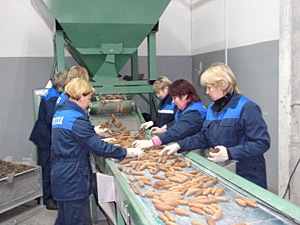National center for breeding and seed production introducing new techniques of saving valuable gene pool
Forestry ‘maternity home’ dubbed so by its director Ludmila Zhiznevskaya is located not far from Minsk. This name did not appeared incidentally as this is exactly the place where seeds are ‘born’ and stored as a reserve for the whole country. Moreover, it is the largest seed-producing facility in Belarus. The metaphor proved so good that is now used almost as a brand name.
At present, the ‘maternity clinic’ is conducing a profound research in the field of selective tree seed production. This year, the staff will be able to implement all stages of the in vitro tree micropropagation technology.
“Within two years we have passed a long and hard way in this area. A biotechnical laboratory is being created and equipped with modern facilities. The technology consists of four stages. We have already mastered two of them, namely adapting and rearing plants in a closed room, greenhouses and fields, as part of a joint research project with the Forest Institute of the National Academy of Sciences. The Institute provided us with the micropropagation regenerants. Currently, we are working on the following two stages, micropropagation and rooting plants in vitro. Our research sector is in charge of that,” says Ludmila Zhiznevskaya.
It is interesting to understand the whole process. How can a plant be grown without seeds? What properties does it have? What is the use of that? Olga Artemchuk, chief of the scientific sector, says: “In fact, we had only six months to equip the laboratory. It is isolated from the other areas because regenerated plants must be grown in germ-free conditions. The first and foremost step of micropropagation is introduction of aseptic fragments of a plant shoots into an in vitro culture. This process as well as micropropagation will take place in the laminar room. In the culture room regenerants undergo the stage of cultivating isolated tissues and cells in special tubes. The last room is the adaptation one. Here plants will be grown in soil, i.e. ex vitro.”
Experts have proven that the technique has a number of unarguable advantages, the most important one being that improved planting material free of viruses and diseases can be obtained. Additionally, all properties of the parent plant remain and material can be reproduced at any time and in unlimited quantities.











